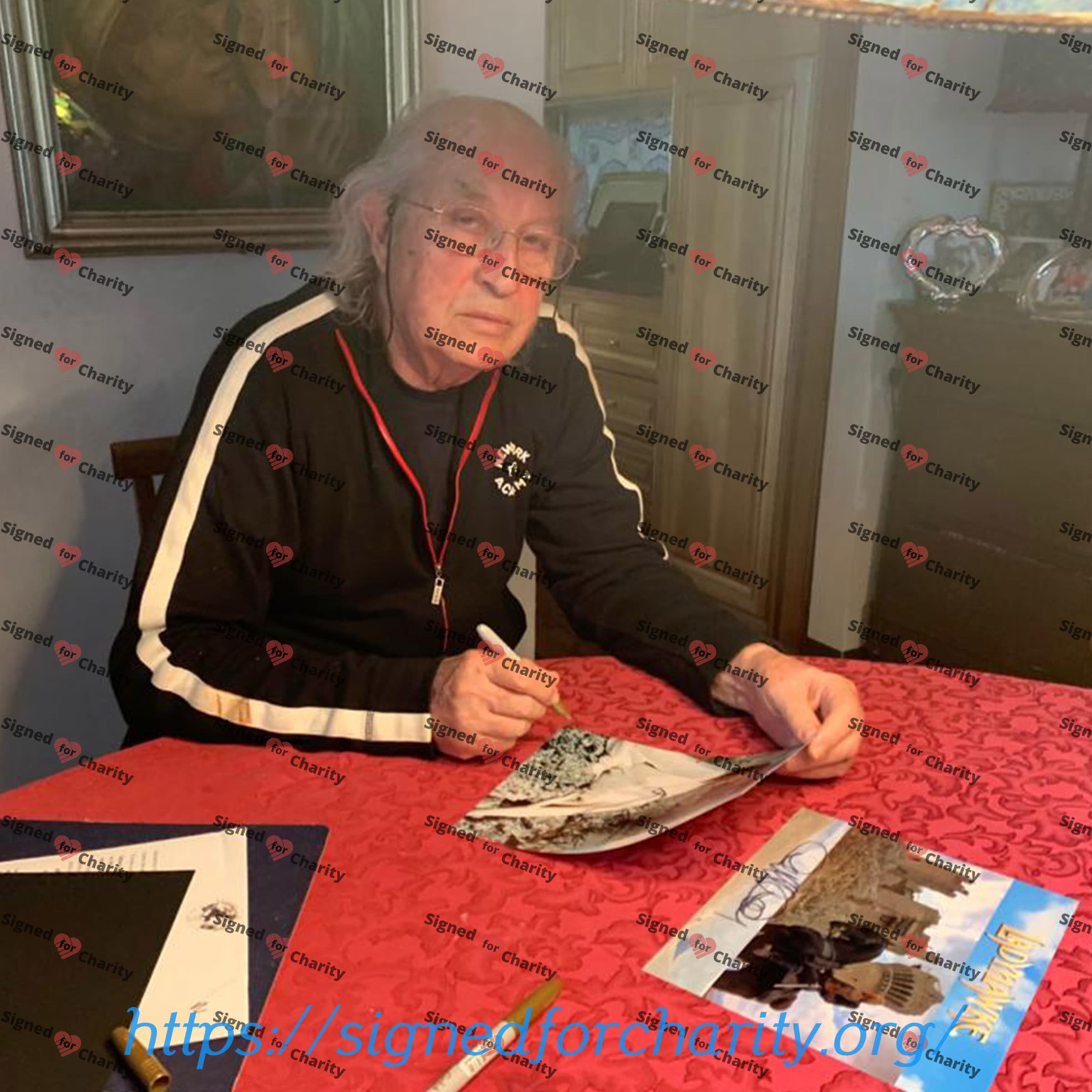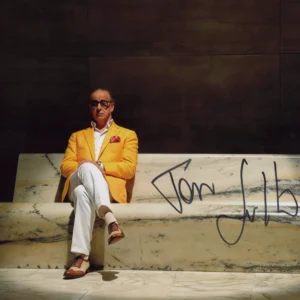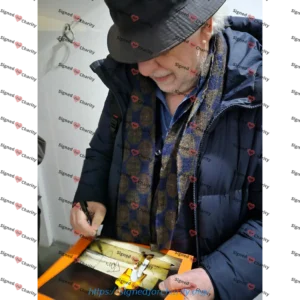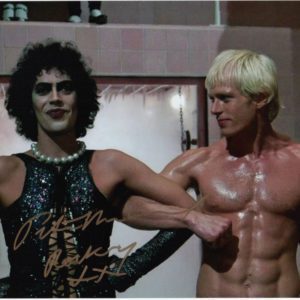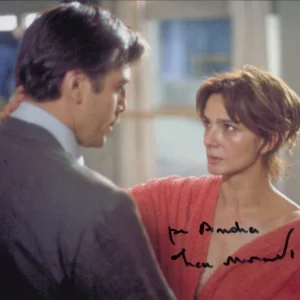Description
Vittorio Storaro (born 24 June 1940 in Rome) is an Italian cinematographer widely recognized for his work on numerous classic films including The Conformist, Apocalypse Now, and The Last Emperor. In the course of over fifty years, he has collaborated with directors such as Bernardo Bertolucci, Francis Ford Coppola, Warren Beatty, and Woody Allen.
He has received three Academy Awards for Best Cinematography for the films Apocalypse Now (1979), Reds (1981), and The Last Emperor (1987), and is one of three living persons who has won the award three times, the others being Robert Richardson and Emmanuel Lubezki.
Storaro is considered to be one of the greatest and most influential cinematographers of all time. He has worked with many important film directors, in particular Bernardo Bertolucci, with whom he has had a long collaboration. His philosophy is largely inspired by Johann Wolfgang von Goethe’s theory of colors, which focuses in part on the psychological effects that different colors have and the way in which colors influence our perceptions of different situations. He first worked with Bertolucci on The Conformist (1970). Set in Fascist Italy, the film has been described as a “visual masterpiece.” Also in 1970, he photographed The Bird with the Crystal Plumage, the directorial debut of Dario Argento and a landmark film in the giallo genre. The first American film that Storaro worked on was Apocalypse Now (1979). Director Francis Ford Coppola gave him free rein on the film’s visual look. Apocalypse Now earned Storaro his first Academy Award. He worked with Warren Beatty for the first time on Reds (1981), and ended up winning his second Academy Award. Storaro won a third Academy Award for The Last Emperor (1987), directed by Bertolucci. Three years later he received a nomination, but did not win, for the Beatty film Dick Tracy. In 2002, Storaro completed the first in a series of books that attempt to articulate his philosophy of cinematography more substantively. He was cinematographer for a BBC co-production with Italian broadcaster RAI of Verdi’s Rigoletto over two nights on the weekend of 4 and 5 September 2010. Woody Allen’s Café Society (2016) was the first film that Storaro shot digitally. He used the Sony F65 camera. In 2017, Storaro was honored with the George Eastman Award. The same year he also attended the New York Film Festival at which he debated with Ed Lachman on cinematography and its transition to digital. His other film credits include 1900, Last Tango in Paris, Dominion: Prequel to the Exorcist, One from the Heart, Bulworth, The Sheltering Sky, Tucker: The Man and His Dream, Ladyhawke, Tango, and Goya en Burdeos. With his son Fabrizio, he created the Univisium format system to unify all future theatrical and television movies into one respective aspect ratio of 2.00:1. As of 2020, this unification has not happened, and the universal replacement of 4:3 televisions by large, wide-screen displays greatly reduces the need to modify scope-ratio films for home theater presentation.
Richard Donner (born Richard Donald Schwartzberg; April 24, 1930 – July 5, 2021) was an American director and producer of film and television, and occasional comic-book writer. After directing the horror film The Omen (1976), he directed the superhero film Superman (1978), starring Christopher Reeve. Donner later went on to direct movies such as The Goonies (1985) and Scrooged (1988), while reinvigorating the buddy film genre with the Lethal Weapon film series. He and his wife, producer Lauren, owned the production company The Donners’ Company (formerly Donner/Shuler Donner Productions), best known for producing the Free Willy and X-Men franchises. In 2000, he received the President’s Award from the Academy of Science Fiction, Fantasy & Horror Films. Film historian Michael Barson writes that Donner was “one of Hollywood’s most reliable makers of action blockbusters”.
Early years
Richard Donald Schwartzberg was born in the Bronx to Jewish parents, Hattie (Horowitz) and Fred Schwartzberg. His father owned a small furniture-manufacturing business. He had a sister, Joan.
Television
Initially, Donner wanted to develop a career as an actor. He gained a bit part in a television program directed by Martin Ritt, who encouraged Donner to become a director instead. Ritt hired Donner as his assistant. Later, Donner was on the staff of Desilu, where he directed commercials. He transitioned into television dramas in the late 1950s, directing some episodes of the Steve McQueen western serial Wanted Dead or Alive and the Chuck Connors western The Rifleman. During his early career as a director he worked on over twenty-five television series, including Have Gun – Will Travel, The Fugitive, Combat!, Get Smart, The Man from U.N.C.L.E., The Wild Wild West, Gilligan’s Island, Kojak, Tales from the Crypt, and The Twilight Zone (such as the episodes “Nightmare at 20,000 Feet” starring William Shatner and “From Agnes—With Love” starring Wally Cox), as well as the serial Danger Island from the children’s program The Banana Splits.
Films
Donner’s first feature film was X-15 (1961), which starred David McLean, Charles Bronson, and Mary Tyler Moore. Seven years passed before he directed his next, Salt and Pepper (1968), with Sammy Davis Jr., and Peter Lawford. His breakthrough film was The Omen (1976). A supernatural horror made in the wake of the success of The Exorcist, the film stars Gregory Peck, David Warner, and Lee Remick. It was the fifth-highest-grossing movie of 1976.
Superman (1978)
In 1978, Donner directed Superman: The Movie, starring Christopher Reeve in the title role. It was a hit worldwide, projecting Reeve to international fame. The film co-starred Margot Kidder as Lois Lane, Marlon Brando as Jor-El, and Gene Hackman as archvillain Lex Luthor. At the box office, it grossed $134 million domestically. Principal photography of Superman included filming of its first sequel, Superman II. Donner filmed most of Superman II with the expectation he would complete the sequel after the release of Superman. Despite the first film’s success, Donner was fired from Superman II. Throughout the filming of Superman and Superman II, Donner had a difficult relationship with executive producers Alexander Salkind and Ilya Salkind and producer Pierre Spengler. The Salkinds refused Donner’s demand that Spengler be fired; instead, the Salkinds replaced Donner as director of Superman II with Richard Lester, who had worked with the Salkinds on The Three Musketeers and The Four Musketeers and as an uncredited producer on Superman. Following Donner’s dismissal, Marlon Brando’s scenes were removed from Superman II and much of the film was re-shot under Lester’s direction. Gene Hackman refused to return for re-shoots; consequently, all the Lex Luthor scenes that appear in Superman II were filmed by Donner, although Donner refused to be credited. Rotten Tomatoes’ summary states that “Superman II meets, if not exceeds, the standard set by its predecessor.” Donner continued to promote the view that his contribution was superior to the rest of the series. Superman II: The Richard Donner Cut was released on November 28, 2006, the same date as the DVD release of the summer film Superman Returns. This version of the film features the re-insertion of Marlon Brando’s scenes as Jor-El, and relies on a minimum of footage shot by Richard Lester.
Post-Superman career
Donner directed mixed commercial flops (Inside Moves, Radio Flyer) and successes (The Goonies, the Lethal Weapon series, Scrooged, and Conspiracy Theory). In the case of Superman, it was Donner who insisted the subject of the comic book superhero should be treated “straight”, that is, portrayed with respect to the fantasy genre’s particular conventions and tone, rather than “camp”; this approach strongly influenced later genre directors such as Tim Burton (Batman, Batman Returns), Bryan Singer (X-Men, X2, X-Men: Days of Future Past), Christopher Nolan (Batman Begins, The Dark Knight, The Dark Knight Rises), and Zack Snyder (Man of Steel, Batman v Superman: Dawn of Justice, Zack Snyder’s Justice League), who have made successful superhero films of their own.
Lethal Weapon (1987–1998)
Donner’s next blockbuster film was the action comedy Lethal Weapon, written by Shane Black. It starred Mel Gibson as a widowed narcotics detective with a suicidal bent “who breaks every rule for the sheer joy of it”. It co-starred Danny Glover as a calm homicide detective with a loving family and consideration for retirement. The film’s action sequences were considered “truly spectacular” and made the film one of the year’s biggest hits. Donner directed six films starring Mel Gibson in total, creating a Lethal Weapon franchise with three sequels; the last of these was Lethal Weapon 4, released in 1998. In an interview in 2000, Gibson described his impressions of Donner: Uncle Dick. He’s a great guy, just terrific. Extremely professional. He’s an old veteran and has an understanding of film that is the culmination of years of experience. He’s got his technical stuff down, his vision down. No matter what you say about Dick, it underrates him. He really loves what he’s doing, loves working with actors, and he allows you freedom to explore all kinds of areas. “All right, kid,” he’ll say, and slap you on the back and let you try something, because even he doesn’t know sometimes. He’s just an extremely charming, talented, great fuckin’ guy. I love him. Donner’s cousin is actor Steve Kahan, who played a policeman tracking Otis in Superman: The Movie, and played Captain Ed Murphy in the Lethal Weapon movie franchise. Donner also cast Kahan in some of his other films.
X-Men
Donner became the executive producer for the 2000 Marvel Comics film X-Men, then also an executive producer for the 2009 X-Men prequel, X-Men Origins: Wolverine. In addition, Donner’s wife has produced all of the films in the X-Men film series under their Donners’ Company brand. On October 16, 2008, Donner and Lauren Shuler Donner received stars in a double ceremony on the Hollywood Walk of Fame for their achievements in motion pictures, located at 6712 Hollywood Boulevard.


